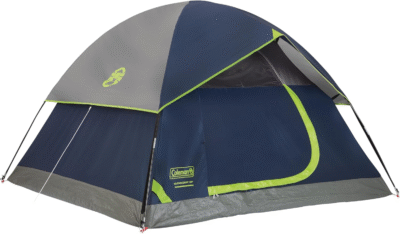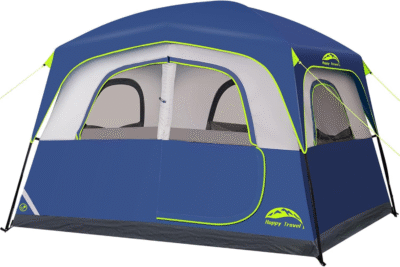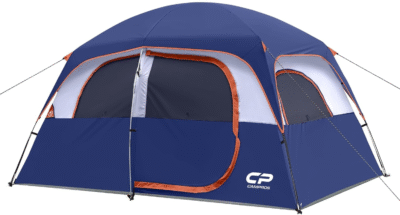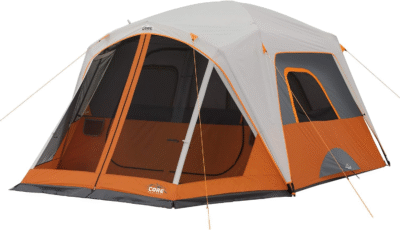Camping is one of America’s favorite outdoor pastimes, with millions hitting the trails and campgrounds each year. But selecting the right tent can make or break your trip—balancing space, durability, and ease of setup against your budget. In this price guide, we’ll break down key factors influencing tent costs, explore price categories with tested recommendations, and help you find the perfect shelter for family adventures, solo escapes, or backpacking hauls. Prices are based on current U.S. retailer averages (like REI, Amazon, and brand sites) and reflect models tested for real-world performance in wind, rain, and comfort.
Best Camping Tents Price List
As the temperatures drop and outdoor adventures beckon, upgrading your camping gear is a must. A reliable tent isn’t just shelter—it’s your base camp for stargazing, family bonding, and escaping the daily grind. With Black Friday deals looming, Amazon is stocked with top-rated options that balance durability, ease of setup, and value. Based on expert reviews, customer feedback, and bestseller rankings, here are the five standout camping tents available on Amazon right now. These picks cater to solo hikers, families, and car campers, all with waterproofing, ventilation, and quick assembly in mind.
1. Coleman Skydome Tent (6-Person) – Best Overall for Families

4.6 out of 5 Ratings
The Coleman Skydome redefines easy camping with its innovative pole structure that sets up in under five minutes and offers 20% more headroom than traditional dome tents. Measuring 10 x 8.5 feet with a 6-foot center height, it comfortably fits two queen air mattresses and gear for a group of six. Its WeatherTec system features welded corners and inverted seams to keep rain out, while large mesh windows and an electrical port ensure airflow and convenience.
Pros: Lightning-fast setup, spacious interior, affordable at around $150.
Cons: Slightly heavier (18 lbs) for backpacking.
Why it’s top-rated: With over 10,000 five-star reviews on Amazon, users rave about its storm resistance and value—perfect for weekend warriors.
2. Forceatt Camping Tent 2/3/4 Person

Price: $74 / 4.5 out of 5 Ratings
Forceatt Camping Tent 2/3/4 Person, Professional Waterproof & Windproof Lightweight Backpacking Tent Suitable for Outdoor, Hiking, Camping, Mountaineering and Travel.
Pros: Ultra-fast assembly, budget-friendly under $100, packs small.
Cons: Less durable in high winds without extra guylines.
Why it’s top-rated: Rank1one crowned it the fastest-setup tent of 2025, and Amazon buyers love its portability for festivals or beach outings.
3. Happy Travel Tent 6 Person Tents – Best for Backpacking

Price: $119 / 4.6 out of 5 Ratings
Happy Travel Tent 6 Person Tents for Camping, Waterproof Easy Setup Camping Tent with Rainfly, Portable Large Family Cabin Tent with 5 Large Mesh Windows and Carry Bag for Outdoor Camping & Hiking.
Pros: Featherlight and compact, excellent ventilation, versatile for solo or duo use.
Cons: Lower headroom for taller campers.
Why it’s top-rated: Featured in Explore’s pre-Black Friday picks, it boasts a 4.6-star average from thousands of reviews for its rain resistance and affordability around $80.
4. CAMPROS CP Tent (6-8 Person) – Best Budget Option

Price: $109.99 / 4.6 out of 5 Ratings
Don’t let the $50 price tag fool you—the CAMPROS CP is a windproof, waterproof powerhouse with a double-layer construction and taped seams. Sized at 8.5 x 7.2 feet (4.5 feet high), it fits two adults comfortably with room for gear, plus large mesh doors for cross-breeze cooling. The included stakes and guylines handle moderate gusts.
Pros: Incredibly cheap, easy clip setup, great for beginners.
Cons: Basic materials may wear faster with heavy use.
Why it’s top-rated: A bestseller on Amazon with 4.5 stars from 20,000+ reviews, it’s praised in USA Today roundups for punching above its weight in stormy weather.
5. CORE 6-Person Instant Cabin Tent – Best for Car Camping Comfort

Price: $209 / 4.6 out of 5 Ratings
CORE’s Instant Cabin lives up to its name with pre-attached poles for a 60-second setup, turning it into a homey 10 x 9 foot space (6.5 feet high) with a screen room for bug-free lounging. The H20 Block Technology repels water, and adjustable vents keep it cool. At 30 lbs, it’s built for car trips, not hikes.
Pros: Roomy divided areas, blackout walls for late sleepers, sturdy frame.
Cons: Bulkier pack size.
Why it’s top-rated: With a 4.7-star rating and features like the integrated screen porch, it’s a hit in CleverHiker’s tests for family glamping.
Whether you’re chasing sunrises in the Rockies or pitching by a lakeside fire, these Amazon tents deliver reliability without breaking the bank. Check current prices and stock, as deals change fast—happy camping!
Factors Affecting Tent Prices
Tent prices in the USA typically range from $100 to over $1,000, driven by several elements:
- Materials and Durability: Budget tents use fiberglass poles and basic polyester, while premium models feature aluminum poles, ripstop nylon, and higher-denier fabrics (e.g., 75D polyester for better tear resistance). Waterproof ratings (measured in mm) also vary—expect 1,500mm+ for rain protection.
- Capacity and Size: Solo or 2-person tents start cheap, but family-sized (4-8 person) options add cost for larger floor areas (e.g., 80+ sq ft) and taller ceilings (6+ ft peak height).
- Features: Extras like multiple doors, vestibules (for gear storage), full rainflies, and ventilation mesh drive up prices. Ease of setup (e.g., hub systems or color-coded poles) and weight (crucial for portability) matter too—backpacking tents under 5 lbs cost more than car-camping behemoths.
- Brand and Testing: Reputable brands like REI, The North Face, and NEMO invest in lab and field testing, justifying higher tags. Inflation and supply chains have nudged 2025 prices up 5-10% from 2024, but sales at REI or Dick’s Sporting Goods can shave 20%.
Pro tip: Always factor in add-ons like footprints ($20-50) for floor protection and stakes for stability.
Price Categories and Recommendations
We’ve categorized tents by price tiers, focusing on versatile car-camping and family models (most popular in the U.S.). Each recommendation draws from expert tests for livability, weather resistance, and value. Capacities are rated for comfort—e.g., a “6-person” tent snugly fits 4 adults.
Budget Tents (Under $200): Great for Beginners or Fair-Weather Trips
These are no-frills domes ideal for casual weekends. They prioritize affordability and quick setup but may falter in heavy storms.
| Tent Model | Brand | Price | Capacity | Weight |
| Sundome 6 | Coleman | $100-154 | 6P (comfortable for 4) | 10-16 lbs |
| Skydome 6 | Coleman | $175 | 6P (comfortable for 4) | 16 lbs |
| Discovery Basecamp 4 | Kelty | $120 | 4P (comfortable for 3) | 8.5 lbs |
Mid-Range Tents ($200-$400): Balanced Performance for Frequent Campers
Here, you get aluminum poles, better waterproofing, and features like dual doors—perfect for three-season use without breaking the bank.
| Tent Model | Brand | Price | Capacity | Weight |
| Wireless 6 | Kelty | $270-280 | 6P (comfortable for 4) | 17 lbs |
| Tungsten 4 | Marmot | $399 | 4P (comfortable for 3) | 7-9 lbs |
| Half Dome 3+ | REI Co-op | $359-399 | 3P (comfortable for 2) | 6-7 lbs |
Premium Tents (Over $400): Top-Tier Durability for All-Weather Adventures
Invest here for lifetime builds with massive space, superior venting, and wind resistance (up to 30 mph). Ideal for families or basecamps.
| Tent Model | Brand | Price | Capacity | Weight | Key Pros | Key Cons |
| Wawona 6 | The North Face | $550 | 6P (comfortable for 4-5) | 20-22 lbs | Huge 86 sq ft + 44 sq ft vestibule, vertical walls for standing room, sturdy aluminum poles, lifetime warranty. | Setup takes 15-20 mins, partial fly on rear door, bulky pack. |
| Base Camp 6 | REI Co-op | $549-569 | 6P (comfortable for 4) | 20-21 lbs | Extra-sturdy four-pole frame, two vestibules (45 sq ft total), full rainfly with 1,500mm rating, accessory-compatible. | Complex setup in wind, footprint sold separately. |
| Aurora Highrise 6 | NEMO | $500 | 6P (comfortable for 4) | 18-19 lbs | Steep walls maximize space, two massive doors with awnings, premium materials and vents, compact when packed. | Second door smaller, rainfly not 100% coverage. |
Where to Shop in the USA
- REI Co-op: Best for in-store testing and member perks (10% back annually); free shipping over $50.
- Amazon: Widest selection with Prime deals; check reviews for real-user photos.
- Brand Sites (e.g., The North Face, Marmot): Direct sales often include bundles; look for seasonal clearances.
- Big Box (Walmart, Dick’s): Budget steals like Coleman, but verify specs.
Prices fluctuate—use tools like CamelCamelCamel for Amazon tracking. For backpacking-specific guides, premium ultralights start at $300 but weigh under 3 lbs.
Final Thoughts
In 2025, the sweet spot for most U.S. campers is mid-range ($200-400) for reliable all-arounders like the Kelty Wireless 6, offering space without excess weight. Budget picks suit novices, while premium tents reward frequent adventurers with longevity. Match your choice to trip type: prioritize lightness for hikes, roominess for RVs. Always test-pitch at home, and remember— a good tent is an investment in epic nights under the stars. Happy camping!
